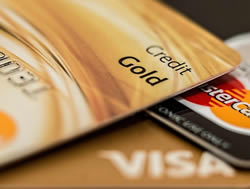Amy Fontinelle* says that avoiding six major credit card mistakes will make your debt more manageable and bring your card balance under control.
 Are you having trouble getting your credit card balances under control?
Are you having trouble getting your credit card balances under control?
If so, don’t beat yourself up; you’re in the same boat as thousands of other consumers.
However, you’ll make your debt more manageable once you choose to change your spending habits.
Take a giant step in this direction by avoiding these six major credit card mistakes.
- Paying the minimum balance
It’s tempting to send in minimum monthly payments (often $15 to $25) when you’re under financial duress.
Don’t do it.
High interest rates charged by credit card companies will keep the bill growing every month.
Instead, send the highest payment you can afford and reduce spending in other areas to focus on paying off the debt.
It might be worth going without extras like the newest smartphone or latest fashion if it means you’ll sleep easier at night, knowing you’ll soon be debt free.
It may not feel like you’re saving money when you increase credit card payments, but you are.
Depending on the interest rate, you’ll save an average of 10 per cent to 29 per cent per year in interest on any balance that you pay off.
If you pay off an extra $1,000 this year, for example, you’ll come out $160 to $290 ahead, depending on the rate.
Chances are money is tight if you’re already in debt, so freeing up extra cash will give you breathing room for the long haul.
Whether you use this money to accelerate debt payments, start an emergency fund or invest in retirement, the power of compound interest will start working in your favour instead of against you.
- Using a card for everyday items
Except in extenuating circumstances, you should have your budget under control enough to pay for necessities with monthly income.
By keeping common purchases like groceries and utility bills off the credit card balance, you’ll take a major step in getting spending under control.
Consider that a $3 bottle of milk bought with a credit card will eventually turn into a $30 bottle if you don’t pay off the balance at the end of each month.
- Chasing credit card rewards
Credit card rewards are usually worth far less than the extra interest you’ll accrue if you can’t pay off the money you spend to earn those bonuses.
You may, for example, receive one point for each dollar you spend but must redeem 5,000 points to get a $100 discount on a plane ticket.
Since the interest charged on outstanding account balances often exceeds the typical 2 per cent bonus, it may not be worthwhile.
You should also avoid signing up for multiple credit cards, regardless of bonuses.
If you already know you don’t manage credit cards well, don’t add temptation in the form of additional cards.
It’s also easier to miss a payment deadline when you have more cards than you can manage.
You can use your card more frequently once you have your debt paid off and know how to avoid new debt.
As long as you pay your balance in full and on time each month, there is nothing wrong with using a credit card instead of carrying cash or to take advantage of rewards.
Just make sure those purchases fit within your monthly budget.
- Taking cash advances
Credit card companies employ tactics like sending cheques in the mail, encouraging you to use them to pay bills or to treat yourself to something nice, but they rarely make it clear these are actually cash advances.
Taking a cash advance is dangerous because you start to accrue interest immediately, unlike regular credit card purchases.
In addition, there’s often no grace period and you’ll be charged an automatic fee that can run as high as 4 per cent on the amount of the advance.
- Using the card to pay medical bills
Medical bills can be overwhelmingly expensive.
If you’re having trouble paying your medical bills, negotiate an agreement with the hospital or other company to whom you owe money.
Don’t add to your bills and stress by tacking exorbitant credit card interest rates on to them.
You should also go through your bills a second or third time, making sure they are accurate and you understand all the charges.
- Ignoring your debt
Some folks get so stressed or embarrassed by credit card debt they stop opening their bills and pretend there’s no problem.
This is obviously a bad approach because, while you’re ignoring the bills, the ticking time bomb of interest rates is adding to the debt.
In addition, if you miss a payment or two, the interest rate may shoot higher under the terms of the card agreement.
You can call card companies if you’re feeling overwhelmed and ask to renegotiate the terms of your agreement.
You may be able to get the interest rate lowered, set up a payment plan, or get some of your debt forgiven.
If your first call doesn’t work, keep calling back because a different customer service representative may allow you to negotiate a better deal.
Ignoring debt can also lower your credit score and spur debt collectors into action.
Finally, don’t let embarrassment prevent you from taking action.
You may assume that everyone else has their finances under control, but many consumers face similar debt problems.
The bottom line
Cleaning up credit card debt takes time and self-control, but the steps outlined here aren’t difficult to follow.
Credit cards become helpful and convenient financial tools once you overcome debt and learn to use them sensibly and responsibly.
* Amy Fontinelle is a financial journalist and editor. She tweets at @AmyFontinelle and her website is www.amyfontinelle.com.
This article first appeared at www.investopedia.com.











